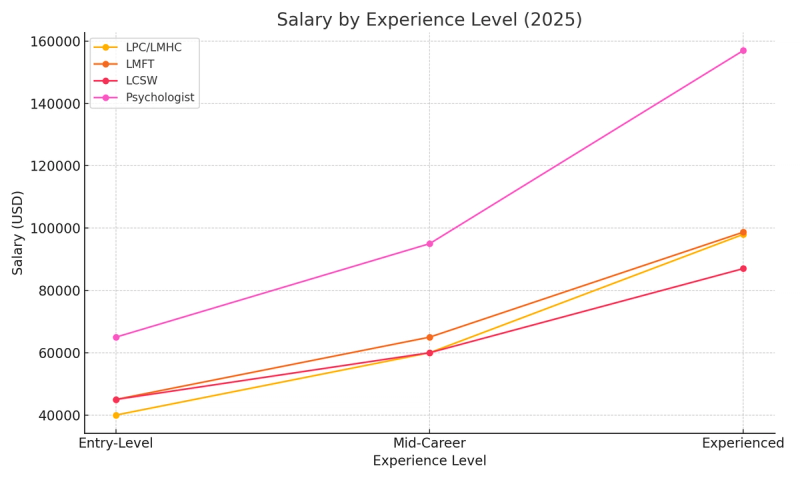
2025 Salary Report for U.S. Mental Health Therapists

This comprehensive report provides salary benchmarks and industry insights specifically tailored for licensed mental health counselors (LPCs), marriage and family therapists (LMFTs), licensed clinical social workers (LCSWs), psychologists, counselors, and social workers as of 2025.
National Average Salaries (2025)
Below are the national median annual salaries across key mental health professions:
Profession | Median Annual Salary |
|---|---|
Licensed Mental Health Counselors (LPC) | $59,190 |
Marriage & Family Therapists (LMFT) | $63,780 |
Licensed Clinical Social Workers (LCSW) | $61,330 |
Clinical & Counseling Psychologists | $95,830 |

Salary by Experience Level
Salaries vary significantly depending on years of experience:
Experience Level | LPC/LMHC | LMFT | LCSW | Psychologist |
|---|---|---|---|---|
Entry-Level | ~$40,000 | ~$45,000 | ~$45,000 | ~$65,000 |
Mid-Career | ~$60,000 | ~$65,000 | ~$60,000 | ~$95,000 |
Experienced | ~$98,700+ | ~$98,700+ | ~$87,000+ | ~$157,000+ |
Experienced therapists often occupy administrative roles or private practice.

Salary by Employment Setting
Employment setting significantly affects compensation:
Employment Setting | Typical Salary Range |
|---|---|
Private Practice | $50,000 – $120,000+ |
Hospitals & Healthcare | $55,000 – $95,000 |
Community/Nonprofit Agencies | $40,000 – $55,000 |
Schools & Academia | $50,000 – $90,000 |
Government | $65,000 – $130,000+ |
Telehealth Platforms | $50,000 – $90,000 |
Regional Salary Breakdown
Regional variations are significant, reflecting local costs of living and demand:
High-Paying States | Typical Median Salary |
|---|---|
Utah | ~$88,980 (LMFT) |
New Jersey | ~$83,590 (LMFT, LPC) |
Alaska | ~$75,000+ (LCSW, LPC) |
Massachusetts | ~$75,000+ (LCSW, LPC) |
California | ~$70,000–$95,000+ |
Lower-Paying States | Typical Median Salary |
|---|---|
Arkansas | ~$45,000 |
Alabama | ~$47,000 |
Mississippi | ~$46,000 |
South Dakota | ~$48,000 |
Urban areas generally offer higher salaries compared to rural regions.
Salary Trends and Future Projections
Recent Salary Trends (2020-2025)
- Rapid Growth: Salaries rose ~15–25% from 2020–2025 due to increased demand for mental health services post-COVID-19.
- Telehealth Boom: Teletherapy and gig-based roles expanded, allowing therapists additional income streams.
Projected Trends (2025-2030)
- Continued Growth: Anticipated 15–19% employment growth.
- Incremental Salary Increases: Ongoing salary adjustments driven by sustained demand and advocacy efforts.
- Pay Parity Initiatives: Efforts underway to achieve pay parity between master’s-level therapists and doctoral-level psychologists for similar services.
Compensation Beyond Salary
Additional financial incentives often supplement salaries:
- Loan forgiveness programs (Public Service Loan Forgiveness)
- Per-session fees for private practice or teletherapy
- Supervision stipends for seasoned clinicians supervising interns
- Retention bonuses and remote work incentives
Conclusion
Mental health therapists continue to experience steady growth in compensation, driven by sustained high demand and evolving work environments. Regional differences remain pronounced, highlighting opportunities for therapists willing to relocate or explore telehealth. Overall, the outlook remains optimistic, with salaries expected to rise incrementally through 2030.
Frequently Asked Questions
ABOUT THE AUTHOR
Michael Tzach
Co-founder
Reduce burnout,
improve patient care.
Join thousands of clinicians already using AI to become more efficient.

Best Reviewed AI Medical Scribe (2026) – According to Clinicians
See why clinicians rate these 7 AI scribes highest in 2026. Compare rankings, real‑world reviews, pricing and HIPAA safeguards to find the best AI scribe for you.

From Backlogged to On-Time: How AI Helped Me Catch Up on 30 Notes
Overwhelmed by notes? See how clinicians are catching up on 30+ notes and reclaiming hours every week with AI.

Best AI for SUD and Addiction Treatment Documentation (2026)
2026 guide to the best AI for addiction treatment documentation. Compare Twofold, Eleos, Kipu, Qualifacts iQ, Lightning Step for SUD notes.

